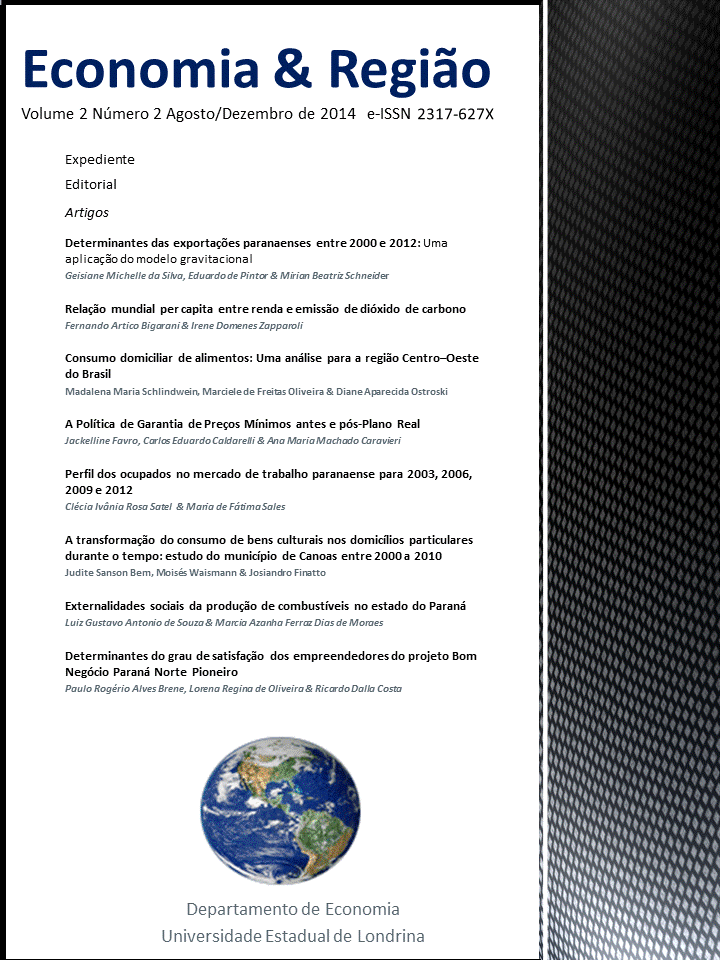The transformation of the consumption of cultural goods in private households over time: study of Canoas between 2000 and 2010
DOI:
https://doi.org/10.5433/2317-627X.2014v2n2p99Keywords:
Cultural Consumption, Household Consumption behaviour, CanoasAbstract
People, over time, change their consumption habits, among these preference changes are included the choice of cultural goods. Among the reasons for this change are the prices, the consumer age, income, education, and others. Canoas' private households residents, municipality located in the metropolitan area of Porto Alegre, not fled to the rule during the decade of 2000, with behaviors that are similar to the consumers of Rio Grande do Sul state. The aim of this work is to study the cultural goods consumption behavior in permanent private households of Canoas in the period in 2000 and 2010. First, the authors outline the good cultural concepts and theories about the consumption of cultural goods from the standpoint of the economy. After the second stage, we use descriptive statistics to present the 2010 IBGE Census data and 2000 that have the presence of cultural goods and services of permanent households of Canoas, making a comparison with the Rio State Grande do Sul ( RS ). It follows that the municipality followed the state moves, but in the period presented a higher percentage of households with assets of greater intensity of technology such as computers and mobile phones.Downloads
References
BAUMOL, William; Bowen, W.G. Performing arts: the economic dilemma. Cambridge: MIT Press, 1968.
BENHAMOU, Françoise. A economia da cultura. Cotia, SP: Ateliê, 2007.
BRASIL. Assembleia da República. Lei nº 107/2001. Brasília, 2001. Disponível em: http://dre.pt/pdf1s/2001/09/209A00/58085829.pdf. Acesso em: 19 mar. 2014.
BRASIL. Instituto brasileiro de Geografia e Estatística. Censo Demográfico - 2000: famílias e domicílios: resultados da amostra. Brasília, 2000. Disponível em: ftp://ftp.ibge.gov.br/Censos/Censo_Demografico_2000/familias/Municipios/. Acesso em: 16 jun.2014
BRASIL. Instituto Brasileiro de Geografia e Estatística Estados. RS. Censo Demográfico 2010: domicílios - amostra. Brasília, 2010. Disponível em: http://www.ibge.gov.br/estadosat/temas.php?sigla=rs&tema=censodemog2010_domic. Acesso em: 05 maio 2014.
BRASIL. Ministério do Desenvolvimento Indústria e Comércio. Estatísticas de Comércio Exterior. Disponível em: http://aliceweb.desenvolvimento.gov.br/ Acessado em: 20 fev. 2014.
CUADRADO, Manuel. El consumo de servicios culturales. Madrid:ESIC, 2002.
DINIZ, Sibelle Cornélio. Análise do consumo de bens e serviços artístico-culturais no Brasil metropolitano. Belo Horizonte: UFMG, 2009. Dissertação (Mestrado em Economia) - Universidade Federal de Minas Gerais, Belo Horizonte, 2009.
DINIZ, Sibelle Cornélio. Análise do setor cultural nas regiões metropolitanas brasileiras. In: ENCONTRO NACIONAL DE ECONOMIA, 36., 2008, Salvador. Anais... Salvador: ANPEC, 2008. Salvador. Disponível em: http://www.anpec.org.br/encontro2008/artigos/200807211651060-.pdf. Acesso em: 04 abr. 2014.
DINIZ, Sibelle Cornélio; MACHADO, Ana Flávia. Analisys of the consumption of artistic-cultural goods and services in Brazil. Journal of Cultural Economics, 2010. Disponível em: http://link.springer.com/article/10.1007/s10824-010-9129-8. Acesso em: 24 jun. 2014.
FARIA, Hamilton. O desenvolvimento cultural como desafio: desenvolvimento cultural e plano de governo. São Paulo: Polis, 2000. p. 7-35.
ITAÚ CULTURAL. Bem Cultural. Disponível em: http://novo.itaucultural.org.br/obsglossario/bem-cultural/. Acesso em: 25 mar. 2014.
PINDYCK, Robert S.; RUBINFELD, Daniel L. Microeconomia. 6.ed. São Paulo: Pearson Prentice Hall, 2005. p. 17-21.
Downloads
Published
How to Cite
Issue
Section
License
Copyright (c) 2014 Economia & Região

This work is licensed under a Creative Commons Attribution 4.0 International License.
Economia & Região adota a Licença Creative Commons Attribution CC-BY 4.0 International, portanto, os direitos autorais relativos aos artigos publicados são do(s) autor(es), que cedem à Revista Economia & Região o direito de exclusividade de primeira publicação.
Sob essa licença é possível: Compartilhar - copiar e redistribuir o material em qualquer suporte ou formato. Adaptar - remixar, transformar, e criar a partir do material, atribuindo o devido crédito e prover um link para a licença e indicar se mudanças foram feitas.




















